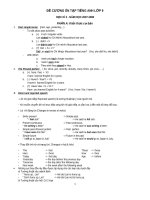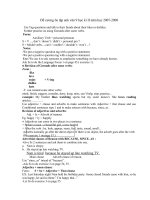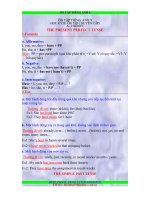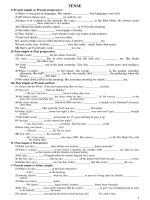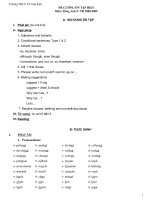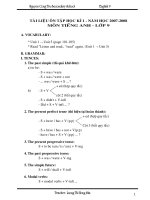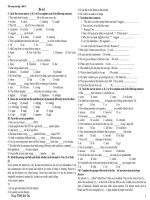Ôn tập anh 9 đầy đủ
Bạn đang xem bản rút gọn của tài liệu. Xem và tải ngay bản đầy đủ của tài liệu tại đây (298.47 KB, 36 trang )
¤N TËP TIÕNG ANH 9
«n tËp tiÕng anh 9
Häc kú ii( ¤N THI CHUYÓN CÊP)
A- THEORY
THE PRESENT PERFECT TENSE
1-Formula
a. Affirmative:
I, you, we, they + have + PP
He, she, it + has +PP
Note: PP = past participle (quá khứ phân từ) ( =V-ed: V có quy tắc, =V3: V
bất quy tắc)
b. Negative:
I, you, we, the + have not (haven’t) + PP
He, she, it + has not ( hasn’t) + PP
c. Interrogative:
Have + I, you, we, they + P.P .... ?
Has + he, she, it + P.P .... ?
2-Use
a. Một hành động bắt đầu trong quá khứ nhưng còn tiếp tục đến hiện tại
hoặc tương lai.
Thường đi với : since (từ khi); for (được bao lâu).
Ex1: She has lived here since 1987
Ex2: They have swum for 1 hour
b. Một hành động xảy ra trong quá khứ, không xác định rõ thơi gian.
Thường đi với: already, ever... ( before), never... (before), not, yet, several
times, many times...
Ex1: She’s been to Japan several times.
Ex2: I have never worked in that company before.
c. Một hành động vừa mới xảy ra.
Thường đi với : lately, just, recently, in recent weeks/ months / years ....
Ex1: My uncle has just come back form Americ
Ex2: They have done the assignment in recent weeks.
HTTP://WWW.VIOLET.VN/MAINHATLE
EMAIL:
¤N TËP TIÕNG ANH 9
THE SIMPLE PAST TENSE
1-Formula
a. Affirmative
Subject + V-ed/ V2 ( V có quy tắc: V+ “ed”; V bất quy tắc; lấy cột thứ 2
trong bảng động từ bất quy tắc)
b. Negative
Subject + did not (didn’t) + bare-infinitive
c. Interrogative.
Did + subject + bare-infinitive .... ?
Note: The simple past form of ‘to be’
* Affirmative:
You, we, they + were ;
I, he, she, it + was
* Negative
You, we, they + were not (weren’t )
I, he, she, it + was not (wasn’t)
* Interrogative
Were + you, we, they .... ?
Was + he, she, it..... ?
2-Use
a. Một hành động đã hoàn tất tại một thời điểm nào đó trong quá khứ.
Thường đi với: yesterday, last... ( last week, last year....), ....... ago (3 days
ago, .... ), in 1999, in 1987....
Ex1: She was here yesterday.
Ex2: They didn’t learn Chinese 3 year ago.
b. Một thói quen ở quá khứ.
Ex1: They often went fishing when they lived in the country.
Ex2: Jack always got up at 3:00 am last year.
HTTP://WWW.VIOLET.VN/MAINHATLE
EMAIL:
ÔN TậP TIếNG ANH 9
c. Mt hnh ng ó hon tt trong mt khong thi gian xỏc nh trong quỏ
kh ( from ... to......)
Ex: From 1981 to 1983, my older brother worked as a journalist
PASSIVE VOICE
1-Gerund rule
Active: S + V + O
Passive: S +to be + PP +( by +O)
Động từ chính của câu chủ động ở thì nào thì tobe phải chia ở thì đó
(PP: Past participle)
Note:
- t t cõu ch ng thỡ (tense) hay th (form) no thỡ be cõu b
ng thỡ hay th ú.
- Khi ta khụng xem ngi thc hin hnh ng (does) l quan trng, thỡ by
object cú th b i. ( eg. does=personal pronoun: he, she, they, we, ....
people; no-one.. )
Example:
a.The simple present
She cleans the floor everyday.
( S + V / Vs / es... )
Passive: The floor is cleaned everyday.
(S + am/is/are/ +PP...)
b.The present continous.
Mr.Baker is repairing the car
Passive: the car is being repaired by Mr Baker. ( S + am/ is/ are + being
+ PP...)
c.The present perfect
HTTP://WWW.VIOLET.VN/MAINHATLE
EMAIL:
¤N TËP TIÕNG ANH 9
Someone has stolen the bicycles ( S+ has/have + P.P...)
Passive: The bicycles have been stolen ( S+ has/have + been + PP...)
d.The simple past
Where did they find the drugs ? ( S + V2/ V-ed)
Passive: where were the drugs found ? ( S+ was/ were + PP.....)
e.The past continuous
They were preparing luch when I came there yesterday (S+was/were +
V-ing .... )
Passive: Luch was being prepared when I came there yesterday.( S+ was/
were + being + PP.....)
f. The past perfect
She had written almost ten pages by 3:00 pm. ( S+ had + PP...)
Passive: Almost ten pages had been written by 3:00 p.m (S+ had been +
PP.....)
g. Will/ would, shall/ should, can/ could, may/might must, have to, be
going to, used to, ........
Active: S+ will/would, shall/ should... + bare-infinitive + object
Passive: S + will/would, shall/shoul.... + be + past participle (+ by
object).
Ex: Police will destroy these drugs.
Passive: the drugs will be destroyed by police.
2-Special cases
a. Active: s1+ verb1( say/believe/think....) (that) +S2+verb2...
Passive:
Cách 1: It + be + PP (verb1) + s2 + verb2 ....
Cách 2: S2+ be+ PP (verb1) + to- infinitive (verb2)...
Ex: People say that he is crazy.
Passive:
It said that he is crazy
HTTP://WWW.VIOLET.VN/MAINHATLE
EMAIL:
¤N TËP TIÕNG ANH 9
He is said to be crazy.
b. Negatives
Ex1: No-one has cleaned the floor lately.
Passive: The floor hasn’ t been cleaned lately
Ex2: We didn’t do anything about it.
Passive: Nothing was done about it.
c. Who + V + object ...... ?
Passive: - By whom..... ?
- Who...... by ?
Ex: Who wrote this novel ?
Passive:
- By whom was this novel written ?
- Who was this novel written by ?
d. It + be + adjective + to-infinitive + sth
Passive: It + be + adjective + for sth + to be + PP
Ex: It is important to finish this exercise.
It is important for this exercise to be finished
e. Bare-infinitive + object
Passive:
Let + object + be + PP
S + be + allowed / advised/asked/ supposed/ .... + to infinitive
Ex1:
Please open the door
Let the door be opened
Ex2:
Turn on the light
You are supposed to turn on the light.
f. Causative form ( thức mệnh lệnh)
Active:
HTTP://WWW.VIOLET.VN/MAINHATLE
EMAIL:
¤N TËP TIÕNG ANH 9
- She + have + sb+ bare-infinitive + st
- S + get + sb + to- infinitive + sth
Passive:
- S + have + sth + PP
- S + get + sth + PP
Ex1:
She has had someone repaint the car
She has had the car repainted
Ex2:
They got me to do the housework
They got the housework done.
RELATIVE CLAUSE
Introduction ( giới thiệu).
Mệnh đề quan hệ/ mệnh đề tính từ là mệnh đề phụ trong câu (không thể
đứng riêng một mình). Nó bắt đầu bằng:
a. relative pronouns (đại từ quan hệ) : WHO, WHOM, WHICH,
WHOSE, THAT.
b relative adverbs (trạng từ liên hệ) : WHERE, WHEN, WHY.
Ex1: A man who dares to do it dares to do anything.
Ex2: We talked to the man who was from Beijing.
1-WHO
* Thay cho danh từ, đại từ chỉ người, có chức năng của một chủ từ.
* Lưu ý “Who” trong cấu trúc:
.... Noun/ pronoun (person) + who + verb .....
Ex1: The man has met your boss.He come from Italy.
subject
→ The man who comes from Italy has met your boss
relative clause
Ex2: We have met the girl. She studies in the shool.
→ We have met the girl who studies in the school.
HTTP://WWW.VIOLET.VN/MAINHATLE
EMAIL:
¤N TËP TIÕNG ANH 9
relative clause
2-WHOM
* Thay cho danh từ/ đại từ chỉ người, có chức năng của một đối từ.
* Lưu ý: “Whom” trong cấu trúc.
.... Noun / pronoun + whom + subject + verb......
Ex1: We like the man. You talked to him yesterday.
object
We like the man whom you talked to yesterday
relative clause
Ex2: Is that the man ?. You have been waiting for him.
object
Is that the man whom you have been waiting for ?
relative clause
3-WHOSE
* Thay thế cho sở hữu cách (possessive cases)
* Xuất hiện trong hai cấu trúc.
- .... noun/ pronoun + whose + noun + verb
- ..... noun/ pronoun whose + noun + subject + verb
Ex1: The girl looks disappoited. Her examination result its so bad.
The girl whose examination result is so bad looks disappointed.
Ex2: That is the girl. I took her hat by mistake yesterday.
That is the girl whose hat I took by mistake yesterday.
4-WHICH
* Thay thể cho danh từ, địa từ chỉ vật
* Có thể làm chủ từ hoặc đối từ
* Lưu ý các cấu trúc.
- ...... noun / pronoun + which + verb ........
- ......noun/ pronoun + which + subject + verb .....
Ex1: She show me the table. It was made by her father.
She shows me the table which was made by her father.
HTTP://WWW.VIOLET.VN/MAINHATLE
EMAIL:
¤N TËP TIÕNG ANH 9
Ex2: Do you like this car ? Mr. Tan bought it last month.
Do you like this car, which Mr.Tan bought last month ?
Note: “Which” có thể được sử dụng để thay thế cho một mệnh đề đứng trước
nó (= and this/ and that)
Ex: Tom is so lazy, and this makes Mrs. Green worried.
Tom is so lazy, which makes Mrs. Green worried.
5-WHERE
* Thay cho trạng từ, cụm trạng ngữ chỉ nơi chốn (place) (eg.here, there, in
that place.... )
* Thường xuất hiện trong cấu trúc:
...... noun/ pronoun ( = a place) + where + subject + verb ......
Ex: We visit the hospital. We were born there/in that hospital
We visit the hospital where we were born.
6-WHEN
* Thay cho trạng từ, cum từ chỉ thời gian (time) (on that day, in the year...)
* Thường xuất hiện trong cấu trúc :
...... noun / pronoun (= time ) + when + subject + verb ......
Ex: She will never forget the day. She first met him on that day
She will never forget the day when she first met him
CONDITIONAL SENTENCES
1-Điều kiện có thể xảy ra ở hiện tại hoặc tương lai (ĐKI) ( possible
condition at present or in future )
If clause : simple present
Main clause : will/shall/can/may + bare-infinitive
Ex1: If it rain, we won’t go for a picnic
Ex2: Our natural resources will disappear if we do not conserve them
Notes :
- Ta có thể sử dụng mệnh lệnh ở mệnh đề chính.
Ex: If you drink, don’t drive
HTTP://WWW.VIOLET.VN/MAINHATLE
EMAIL:
¤N TËP TIÕNG ANH 9
- Ta có thể sử dụng “should” ở mệnh đề điều kiện để tỏ ý nghi ngờ.
Ex: If he should call, tell him I will ring back.
- Dạng rút gọn ở mệnh đề điều kiện (if possible, if necessary, if so................)
Ex: If necessary, I will help you.
-Ta có thể sử dụng dạng mệnh lệnh để thay cho mệnh đề chỉ điều kiện.
Trong trường hợp này, giữa hai mệnh đề thường có các liên từ như sau:
and, or, else, otherwise.
2-Điều kiện không xảy ra ở hiện tại (ĐK II) (present unreal condition )
Main clause: would/could/might + bare-infinitive
If clause: simple present
Ex1: If she had wings, she would fly to an island
Ex2: He would build more houses if he were a king.
Note:
- ‘If I were you/I were in your position.................’được sử dụng để
khuyên nhủ.
Ex: If I were you, I would accept the invitation ( = You should accept the
invitation ).
- “Were to + bare –infinitive” có thể được sử dụng để thay thế động từ ở
“simple past” trong mệnh đề chỉ điều kiện
Ex: If I were to ask him nicely, he would help us.
GERUND
The gerund is used as a subject, a complement, an object of a verb or an
object of a preposition ( danh động từ được sử dụng như một chủ động, bổ
túc từ, túc từ của một động từ, hay túc từ của một giới từ).....
Ex1: Seeing is believing ( S= gerund)
Ex2: Her hobby is listening to music ( complement = gerund)
Ex3: They have finished doing exercises ( object = gerund)
Ex4: We are font of playing football (Object of an preposition = gerund)
Note:
Danh động từ theo sau các động từ: to enjoy, to mind, to avoid, to finish, to
practise, to suggest, to postpone, to delay, to imagine, can’t help/stand...
Lưu ý cách sử dụng của các động từ :
HTTP://WWW.VIOLET.VN/MAINHATLE
EMAIL:
¤N TËP TIÕNG ANH 9
• Forget + to-infinitive : quên (sẽ/ phải) làm gì
Forget + ing : quên đã làm việc gì.
Ex1: She forgets being taken to the zoo by her father when she was six
Ex2: Don’t forget to shut the door before leaving.
• Remember + to-infinitive : nhớ ( sẽ/ phải) làm gì;
Remember + V-ing : nhớ đã làm gì
Ex1: They always remember going to cinema together.
Ex2: They remember to have a test on Wendnesday.
• Stop + to-infinitive : dừng ( một việc) lại để làm gì;
Stop + V- ing : dừng làm một việc gì.
Ex1: This moring , I saw Mr.Pike in the street, so I stopped to greet him
Ex2: The teacher asked us to stop talking
• Need + to- infinitive: cần làm gì ( active);
Need + V-ing: cần được ( passive)
Ex1: We need to repair the car.
Ex2: The car needs repairing.
- Lưu ý cấu trúc:
a. S + spend + time + V-ing .... = It + take + s.b + time + to-inf
b. To-inf/ V-ing + be + adj/ noun.... = It + be + adj/ noun + to-inf ..
= S + V+ it + adj / noun + to-inf....
CLAUSE OF REASON
+Mệnh đề chỉ lý do là mệnh đề phụ bắt đầu bằng các liên từ chỉ lý do như
BECAUSE, AS, SINCE. Ba chữ này đều có nghĩa vì, bởi vì nhưng cách
dùng khác nhau.
Ví dụ:
a) Because
- Because he was sleepy, he went to bed. – He went to bed because he
was sleepy.
Anh ấy đi ngủ vì anh ấy buồn ngủ.
Mệnh đề phụ có chữ because có thể đứng trước hoặc sau mệnh đề chính.
Tuy nhiên phải chú ý nếu mệnh đề phụ đi trước phải có dấu phảy (,) ngăn
cách nó với mênh đề chính
HTTP://WWW.VIOLET.VN/MAINHATLE
EMAIL:
¤N TËP TIÕNG ANH 9
b) As
- As she was free , she came to see me.
Vì cô ấy rảnh rỗi, cô ấy đến thăm tôi.
c) Since
- Since he doesn’t like music , he never goes to the concert
Vì anh ấy không thích nhạc, anh ấy không bao giờ đi xem hoà
nhạc.
Mệnh đề since và as luôn đứng trước mệnh đề chính.
+Ngoài ra, đồng nghĩa với Because, As và Since còn có Now that, So/ As
Long As và Inasmuch As.
Ví dụ:
a) Now that = Because now
- Now that Peggy has a car , she can drive to school.
Vì giờ đây Peggy có xe rồi, cô ấy có thể lái xe đi học.
→ Now that được dùng cho tình huống hiện tại và tương lai ( present
and future situations). Mệnh đề phụ Now that luôn đứng trước mệnh đề
chính.
b) So/ As Long As
- As long as ( So long as) you’re not busy. Can you help me ?
Vì bạn không bận rộn, bạn có thể giúp tôi ?
c) Inasmuch as
Thường được dùng trong văn viết trịnh trọng (formal writing ).
- Inasmuch as the two governments could not reach an agreement, the
possiblities for peace is still remote.
Vì hai chính phủ không thể đi đến một sự nhất trí, khả năng hoà bình
vẫn còn xa.
+Ngoài các liên từ phụ thuộc ( Subordinating Conjuctions) như Because,
Since, As, Now that, As long as, Inasmuch as ... chúng ta còn một liên từ kết
hợp ( Co-ordinating conjuctions) FOR chỉ lý do.
HTTP://WWW.VIOLET.VN/MAINHATLE
EMAIL:
¤N TËP TIÕNG ANH 9
* Liên từ kết hợp là liên từ nối hai mệnh đề độc lập (independent
clauses) và không dùng ở đầu câu.
Ví dụ:
- I phoned her, for I wanted to tell her about her exam.
Tôi gọi điện cho cô ấy vì tôi muốn nói với cô ấy về kỳ thi của cô ấy.
+Mệnh đề chỉ lý do còn có thể đổi ra cụm từ chỉ lý do ( phrases of reason)
với because of hoặc due to.
Ví dụ:
- Because the weather was cold, we stayed home.
→ Because of the cold weather, we stayed home.
→ Due to the cold weather, we stayed home.
Vì thời tiết lạnh, chúng tôi ở nhà.
Because và Because of
Because và Because of đều có nghĩa là bởi vì nhưng chúng được dùng với
cẩu trúc khác nhau.
a ) Because là một liên từ (Conjunction), theo sau nó là một mệnh đề
(Clause).
Ví dụ:
- Because the traffic was heavy, we were late for the meeting.
S V
Vì xe cộ đông đúc, chúng tôi đến buổi họp trễ.
b) Because of là nhóm giới từ ( Prepositional phrase), theo sau nó là một
cụm danh từ ( noun phrase)
Ví dụ:
- Because of the heavy traffic, we were late for the meeting.
B-PRACTICE
Conditional Sentences
VIẾT LẠI CÂU
1. You got into so much trouble because you didn’t listen to me.
→ If_________________________________________________
2. There are so many bugs in the room because there isn’t a screen on the
window.
HTTP://WWW.VIOLET.VN/MAINHATLE
EMAIL:
¤N TËP TIÕNG ANH 9
→ If_________________________________________________
3. He is busy right now. So, he can’t help them.
→ If_________________________________________________
4. I can’t make all of my own meals because I am not good at cooking.
→ If_________________________________________________
5. I’m not you, so I can’t tell him the truth.
→ If I________________________________________________
6. She came, so he wasn’t disappointed.
→ If_________________________________________________
7. He is not a good student. He didn’t study for the test yesterday.
→ If_________________________________________________
8. I didn’t eat breakfast several hours ago, so I am hungry now.
→ If_________________________________________________
9. Mai is sick because she didn’t follow the doctor’s orders.
→ If_________________________________________________
10.He is tired this morning because he didn’t go to bed early last night.
→ If_________________________________________________
11.They don’t behave themselves so their parents are not happy about that.
→ If_________________________________________________
12.She didn’t say sorry so he was angry.
→ If_________________________________________________
13.I am not a rich businessman and I can’t afford to buy an expensive car.
→ If_________________________________________________
14.It rained last night so I didn’t go to the barbecue.
→ If_________________________________________________
15.My parents do not allow me to go, so I have to stay at home.
→ If_________________________________________________
16.She doesn’t pay attention to her cooking so the food is horrible.
→ If_________________________________________________
17.The weather was very nice so we didn’t go camping.
→ If_________________________________________________
18.The computer broke down and I had to stop my work.
→ If_________________________________________________
19.She loves him so she forgives him easily.
→ If_________________________________________________
20.He was angry so I didn’t say anything.
→ If_________________________________________________
II) TRẮC NGHIỆM
HTTP://WWW.VIOLET.VN/MAINHATLE
EMAIL:
¤N TËP TIÕNG ANH 9
21.If I ……….a lot of money now, I …………..a new car.
a. have /will buy b. have / would buy
c. had/ will buy d. had/ would buy.
22. If I ……………you, I …………….do that.
a. am/ will b. were /would
c. were/ will d. had been/ would.
23.If I were offered the job, I think I ………. it.
a. take b. will take
c. would take d. would have taken.
24.I would be very surprised if he……………..
a. refuses b. refused
c. had refused d. would refuse.
25.Many people would be out of work if that factory………..down.
a. closes b. had closed
c. closed d. would close.
26.6. If she sold her car, she ………… much money.
a. gets b. would get
c. will get d. would have got.
27.They would be disappointed if we…………….
a. hadn’t come b. wouldn’t come
c. don’t come d. didn’t come.
28.Would John be angry if I ……. ……his bicycle without asking?
a. take b. took c. had taken d. would take.
29.She ……….terrible upset if I lost this ring.
a. will be b. would be c. were d. had been.
30.If someone…………in here with a gun, I would be very frightened.
a. would walk b. walks c. had walked d. walked.
31.What would happen if you ……………..to work tomorrow?
a. don’t go b. didn’t go c. won’t go d. wouldn’t go.
32.We ‘ll get wet if we ………….out.
a. go b. did go c. went d. had gone.
33.If I go shopping, I ………some food.
a. buy b. will buy
c. would buy d. would have bought.
34.If I find it, I ………you.
a. will tell b. would tell c. had told d. told.
35.What would you do if you……………a million dollars?
a. would win b. win c. had won d. won.
HTTP://WWW.VIOLET.VN/MAINHATLE
EMAIL:
